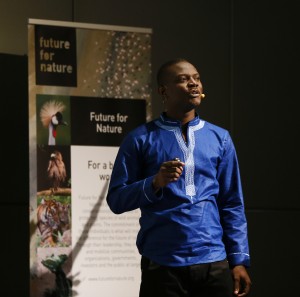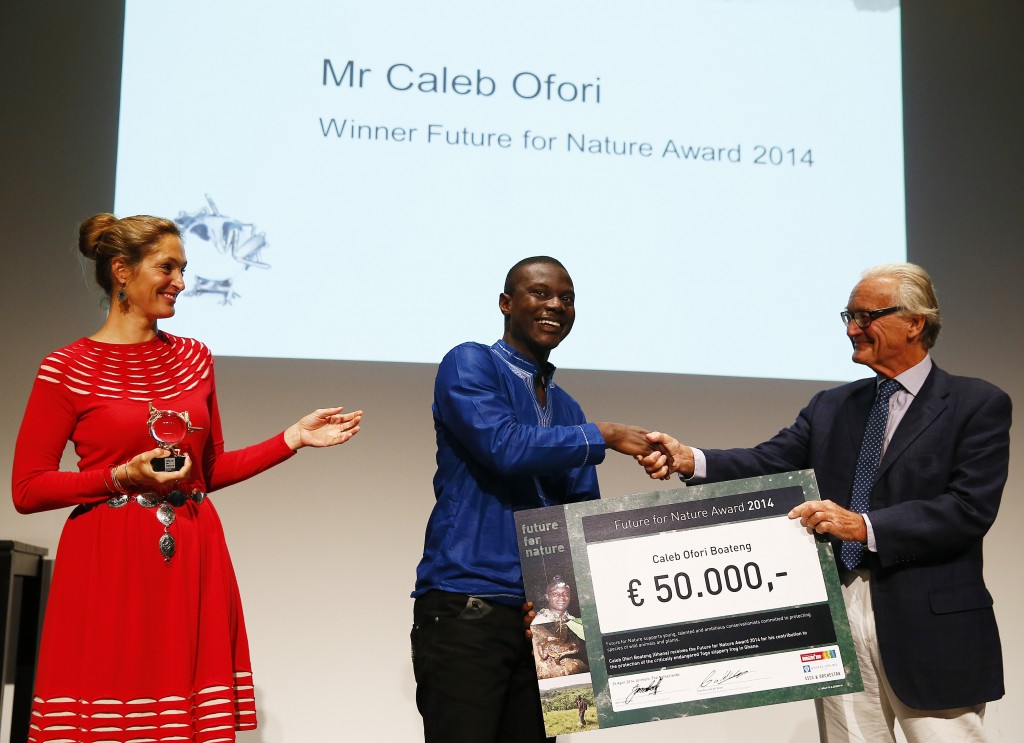It was midmorning at the exquisite auditorium in the middle of the Burgers Zoo in Arnhem, Netherlands when I took my turn to address 500 distinguished personalities who came to be part of that special event- The 2014 Future for Nature Award Ceremony. I had been chosen by a panel of international experts to be one of three lucky winners of this prestigious award; an award that honors young conservationists each year for their contribution to nature conservation. It was a truly special moment for me and my family. The introduction prior to my presentation was very detailed. It talked about my immense love for nature as a child, my solace in religion during my difficult life as a teenager, and how today I use the rhetorical platform of religion to inspire species conservation and environmental stewardship. As I stepped onto the stage, tears flooded my eyes as scenes of my past raced through my mind.
The Future for Nature Foundation supports young, talented and ambitious conservationists who are committed to protecting species of wild animals and plants. The foundation believes that it is the commitment of individuals that will make the difference for the future of nature. Accordingly, it organizes an annual event to present a prestigious award to three such deserving individuals. The award ceremony itself provides an opportunity to further highlight the work and achievement of the award winners as role models who can pass on their passion for nature conservation to other young people.
I was chosen to be one of the 2014 winners because of my contribution to amphibian conservation in Ghana. Through an organization I founded in 2006 to conserve Ghana’s amphibians, my volunteers and I have significantly promoted amphibian conservation in Ghana. Our efforts have helped reduced threats to the survival of several threatened species including one that is Evolutionary Distinct and Globally Endangered (the Togo slippery frog). In the past seven years we have strived to protect key frog habitats from mining and also contributed to the improvement of the habitat of native frog species by restoring tree cover to degraded forest habitats.
The success my colleagues and I have chalked is largely attributed to the behavior change strategy we adopted in working with local communities. These rural communities are in general poor but highly religious and poverty is such a significant force that has for many years militated against conservation efforts in this and many other localities in Africa (for example people have no motivation to protect species when they are themselves hungry). Fortunately religion provides a window of opportunity through which conservation objectives can be realized.
In the past, tenets in the traditional religious practices throughout Ghana have protected nature by controlling wildlife exploitation, preventing the degradation of riparian areas and creation of traditional reserves “sacred groves”. However, with the advent of Christianity and Islam in Ghana in the past half a century, there have been significant shifts in the percentage of the Ghanaian population that subscribe to these traditional religious practices. About 70% of the Ghanaian population currently subscribes to Christianity whilst close to 20% are Muslims. The current trend in religious subscription has come with it a drastic decline in the appreciation of nature.
In recognition of the fact that religion has and continues to be such a significant force in Ghana and throughout Africa, my organization has adopted innovative ways of integrating conservation into these dominant religious groups with great success. The strategy dubbed “Conservation Evangelism” uses scientific evidence presented on religious platforms to educate and inspire change that is beneficial to species conservation.
I truly believe that every species deserves to be given a fair chance to fight for its survival. Unfortunately, in the world we live in today species are sentenced to mass extirpation without access to either a fair jury or even a lawyer. To think of it, if evolution resulted in you being a slimy frog, then a chance of you having a trial is even unlikely. The species judges and magistrates are usually politicians and big corporations but sometimes all of us through our actions and inactions have sentenced so many species already to extinction. I believe that change is coming and HerpGhan is catalyzing this change by given people the opportunity to appreciate nature. This is why part of my Future for Nature prize funds will be used to provide video and photographic inventory of the beautiful biodiversity in the hilly regions of Ghana.
This award crowns years of hard work, dedication and passion to species conservation in Ghana. Our success would not have been possible without the help of many volunteers and funding organizations including the ZSL EDGE fellowship program.

